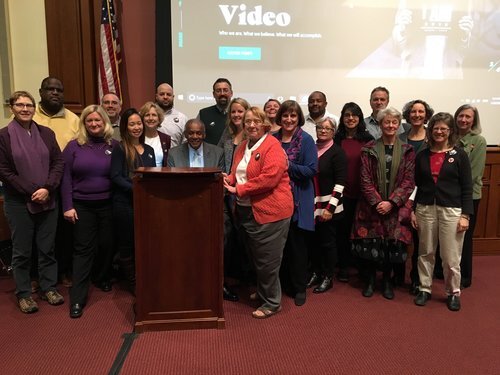In our conversations and negotiations, SHARE often points out that the success of SHARE members is tied to the success of our hospital. We must also be aware that our future is intimately intertwined with that of our broader community.
Last year, SHARE leaders experienced a concrete and meaningful example of this interconnectedness as we gathered to see Bill Lucy at a public lecture on the 50th anniversary of the Memphis Strike. Mr. Lucy had been Jerry Wurf’s leadership partner in AFSCME as the Memphis sanitation workers’ sought to organize their union. (AFSCME is, you’ll recognize, the parent organization of our own union.)
Bill Lucy spoke about his personal experience with the Memphis strike as part of the Harvard Trade Union Program. Each year, HTUP draws union leaders in an intensive six-week educational course to learn from one another, as well as leading scholars and researchers. (The HTUP cohort that year included SHARE Organizers Bobbi-Jo Lewis and Melissa Markstrom.)
Mr. Lucy’s talk was a moving firsthand account. His presentation was punctuated by a series of questions during a Q&A session . . . as well as as a surprising statement by a woman named Jennifer Glass. The young Ms. Glass stood and claimed already to know the stories that Mr. Lucy related. She knew those stories well, she said, because she had heard them from her grandfather, one of the 1300 men who went on strike in Memphis in order to unionize their sanitation worker jobs.
Those of us in the audience couldn’t help but overhear in her comments real, heartfelt gratitude to Bill Lucy for helping to make possible opportunities in her own life. Ms. Glass had walked over to the talk from Harvard’s Kennedy School of Government, where she worked. On behalf of her grandfather, who had since passed on, Glass thanked Mr. Lucy for his help and involvement in her grandfather’s cause. American History got very intimate for me in that impromptu moment. I’m grateful to have been there to see Mr. Lucy and Ms. Glass speaking across the auditorium.
REALIZING THE DREAM
The Memphis Sanitation Workers ultimately succeeded in organizing. When they voted-in their union, they provided themselves an independent source of power, the right to negotiate, and all of the privileges and protections that come with being able to work collectively.
This story is not over, however. The arc of history is long. Obviously, harsh inequalities persist. Gaps in pay, education, and health create chasms between races and communities. SHARE recognizes these disparities, even in our own workplace. And we recognize our obligation to continue in the tradition that includes Dr. King, Mr. Lucy, Mr. Wurf, Mr. Cole, Mr. Walker, and countless others. We are grateful to Martin Luther King, Jr.’s model as we foster our own community, and work to take care of those around us.
“Life’s most persistent and urgent question,” Dr. King said, “is ‘what are you doing for others?’”
—Kirk Davis, SHARE Staff Organizer
***
The sanitation workers’ struggle is documented in documentaries including I Am a Man and At the River I Stand, as well as the book Going Down Jericho Road.


